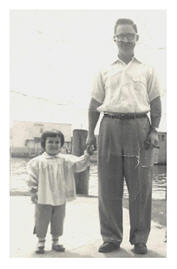My mother told me once: “You have daddy issues.” If I did, which I no longer doubt, at the time I didn’t fully understand the importance of the father-daughter relationship.
 Those were years when my mother’s words fell on deaf ears and well-developed defense mechanisms. I was convinced that if I did have daddy issues, it was her fault for making my father’s life so disagreeable that he preferred to be out of the house rather than part of the family.
Those were years when my mother’s words fell on deaf ears and well-developed defense mechanisms. I was convinced that if I did have daddy issues, it was her fault for making my father’s life so disagreeable that he preferred to be out of the house rather than part of the family.
I had little understanding then of what marriage is about, and the complex dynamic that evolves over time, for better or worse.
Given that I had little relationship with my dad during those years, if anything, remarks concerning who and what we were to each other seemed irrelevant.
Fathers and Daughters
My mother’s comments likely originated in the fact that I frequently dated older men, certainly in my twenties. She knew little of my social life – there wasn’t that much to know – until I was semi-serious about a man who was 40 when I was only a few years out of college.
He was a kind man, and a responsible man – divorced with kids. It was years later that I realized he was, indeed, fulfilling a role that my own father hadn’t. He was a mentor professionally, very protective, and he absolutely adored me.
Were there “daddy issues” at play after all?
While I’m no expert on father-daughter relationships, it’s evident now that I was living out one flavor of the daddy dilemma, trying to fill the void where my dad wasn’t for so much of my life.
Why Dads Matter to Daughters
Psychology Today shines light on the importance of fathers to their daughters in “How Dads Shape Daughters’ Relationships.”
Psychologist Jennifer Kromberg explains:
… If there was a dad or other male caregiver in your early life, he probably set the first model of how a relationship with a man would be… children love their parents/caregivers unconditionally and accept the attachment and love that is (or is not!) given in return as normal. Our first attachment patterns shape our expectations for future attachments.
I find myself thinking about my loner tendencies, my relatively low expectations for the man I married, and trust issues that were reinforced by a messy divorce.
As my dad traveled and rarely stuck around the house when in town, I recognize that he established a pattern I have watched unfolding over decades, and the lesson learned: men leave.
Parents Establish Models of “Normal” Behavior
Was my expectation that men keep their distance and eventually abandon us a self-fulfilling prophesy? Was my father’s invisibility more significant than I ever realized?
No doubt the answer is yes in both cases.
Dr. Kromberg continues:
… our parents teach us how to approach our lives and relationships – they teach us how to express and receive love, how to handle disagreements, how to process feelings… the lens through which we see and organize meaning about other human interactions.
I was fortunate in getting to know my dad as an adult, some three or four years before his death. Only then did I have a glimmer of understanding about how much I had missed. But I didn’t yet comprehend the ways his absence shaped my expectations, my behavior, and my choices.
Beyond the Early Years: Adult Daughters and Fathers
 As a child I remember feeling envious of the families that went away on vacation with both Mom and Dad, which was never the scenario in our family. Now, I can imagine how this must have hurt my mother.
As a child I remember feeling envious of the families that went away on vacation with both Mom and Dad, which was never the scenario in our family. Now, I can imagine how this must have hurt my mother.
I was also envious of father-daughter relationships I saw between some of my friends and their dads, while others had little relationship as was the case for me. This was an era when women were charged with child-rearing, and an involved father was a bonus, not the norm.
Author of “The Unavailable Father,” Dr. Sarah Simms Rosenthal addresses adult daughters and their fathers, especially when memories are less than rosy. She writes:
… One’s father provides a model for how to interact with the world at large… A father provides his daughter with a model for how men should act, in particular for how men should treat women.
I found the following observation interesting as well, recognizing the times in my twenties that I made choices in order to curry my father’s favor.
Even adult women who have achieved noteworthy successes in a profession or in business activities typically continue to place great value on the approval that they receive from their fathers for their accomplishments.
On Emotionally and Physically Absent Fathers
If my father was emotionally unavailable to me for much of my life, and he was, I note extremes in my relationships – men who were equally emotionally unavailable, or men who adored me to the point of suffocation.
Oddly, this is a recent realization, as I acknowledge that I have followed a meandering path to a place of healthier relationships.
 If I have little that is tangible of my dad – four or five photographs, two children’s books dating to the 1930s – at least I have good memories from the period before he died. That is more than some can say of a parent.
If I have little that is tangible of my dad – four or five photographs, two children’s books dating to the 1930s – at least I have good memories from the period before he died. That is more than some can say of a parent.
Whereas my mother’s love for me was anything but unconditional, my brief reacquaintance with my father in his last years was nevertheless healing. And yet, when a car accident took his life, I felt abandoned all over again. Whatever walls I had let down, I quickly began to reconstruct.
This, too, is clarity born of introspection after the end of my marriage.
Important in Their Presence, Important in Their Absence
For years, the most important thing about my father was his absence, and with it the sense that there could have been more: a meaningful, gentle, encouraging relationship – if only circumstances had been different. “If only” remains a shadow that I live with.
While I was grateful for the father-daughter relationship we were able to build before his death, was it already too late to change the poor patterns that were established?
Looking back at my marriage, for me, the answer is yes.
Two decades later, am I able to see the gifts he gave me all the same?
Again, the answer is yes.
You May Also Enjoy
I have been working very hard to build a strong foundation/relationship with my daughter. She’ll be 10 in a month and she is amazing.
In some ways she is far more like me than my son and that is not a bad thing but it does present some challenges because when we butt heads she is so damn stubborn. 🙂
To me the most important thing has been to make sure she knows I love her and that even when we disagree it doesn’t change that.
Sometimes I see the “gender” differences frustrate her because there are things that my son and I just “get” about each other that I attribute to being boys.
My daughter and I have a lot of stuff that we laugh or agree about but every now and then she’ll look at her brother and I and say something like, “I don’t understand you at all.”
Anyway, I am glad you see the gifts your dad gave you. That is something that can last forever.
This hits HOME with me! My Father too was always traveling. I only remember once the three of us going to see THE SOUND OF MUSIC! We never went on a vacation together… once to TAHOE when I was about 7. We were hit by a teenager who lost control in the snow! That’s my only memory of that trip! He was not a very loving man, I never could talk to him. He has passed now and recently I thought how I NEVER think of HIM! There really is not much to remember……….. How sad is that! I will buy the book you recommended here.
Perhaps,that will be a good read for me.
Thanks for this post. It really is an important factor to have a father in a daughers life. I don’t know how my life would have turned out without both parents present. I always injoyed the family time we spent together.